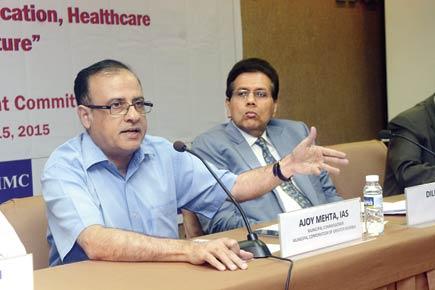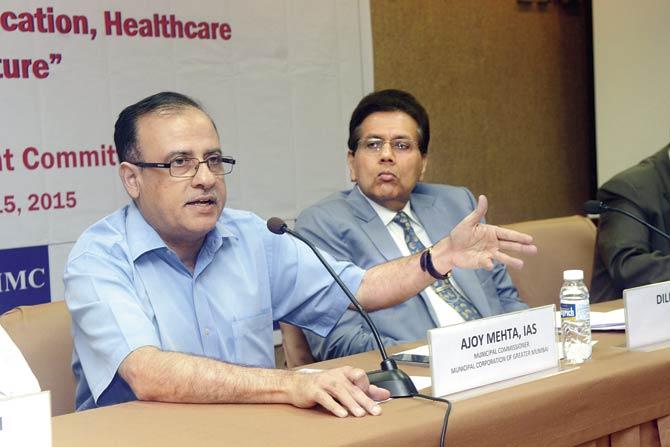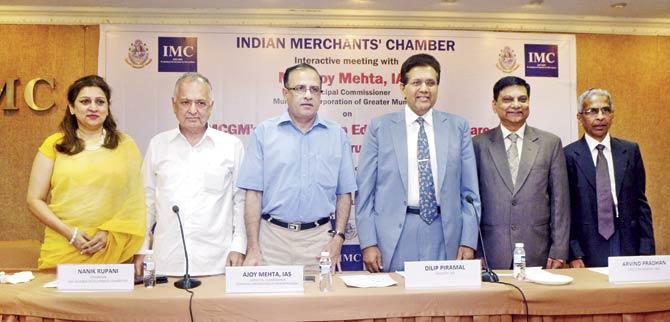Civic authority commissioner Ajoy Mehta is bullish on the city and says citizens have no need to despair, as he talks straight to a charged audience on all matters Mumbai

An eager and excited audience played the waiting game at a recent Meet Your BMC Commissioner Mr Ajoy Mehta interactive meet, held at the Indian Merchants Chamber building, Walchand Hirachand Hall at Churchgate.
The meet took place on Wednesday, July 15 evening. The meet was to start at 5 pm but there was not sign of the commissioner till past 6.30 pm.

Ajoy Mehta makes his views known
Dilip Piramal, president IMC said to the restive audience that the Commissioner would most probably not have time to answer too many questions as he would be late, he expedited the process asking people to cite their questions and wrote them down so that relevant, concise questions could be put to the Commissioner.

Ajoy Mehta (third from left) stands alongside others on the panel
Some of the concerns centred around potholes, one gent said that storm water drains have disappeared at Malabar Hill and they should be restored, another stated that there should be proper sewage lines in slums and yet another expressed concern over the dilapidated condition of a BMC school in Jogeshwari which is now defunct and overrun by unsavoury activities.
Piramal had to repeatedly tell people to keep their questions to the point, and not make meaningless remarks. Sporadically, those listening were shown a mobile phone and told that the IMC has just received a message from Mehta, “He should be here in 10 minutes.” Several people started exiting the hall by 6.15 pm and the once full house now had several empty chairs.
Apologies, first up
Finally, at approximately 6. 40 pm, there was a flurry of press flashbulbs, and in strode Ajoy Mehta, to excited murmurs of, “he’s come, he’s arrived.” Mehta first up, apologized profusely for the delay. “I apologize. It is not in my nature to be late.
First, I was caught up because the Assembly Session is on and then, we had a long meeting because of the upcoming Ganeshotsav festival. Please forgive me,” he said, to some surprised looks from people who may not have expected humility from the chief. Mehta brushed away formalities quickly like introductions and the usual thanks-for- coming address.
“I will come to the issue, straightaway, instead of droning on and on. There is primarily a three-pronged approach to the BMC. First, is the short term work which we have to do immediately which is things like, ensuring clean water and pothole free roads. Long term issues would be those like the Coastal Road, providing housing and hospitals.
Yet a third prong is that when a person walks into the Corporation he should have a delightful experience.” (there were a few snorts of disbelief at this). The erudite Mehta though did not take notice and elaborated, “a person should not be horrified at his Corporation experience stating: yeh kya hai?”
At this, then, the Commissioner stopped his address and said that, “I will now request you for questions, comments, advice so that I can answer or at least apologize for shortcomings.”
Housing and health
By now, several people in the audience who seemed turbo-charged on several issues, seemed to be taken aback at this attitude. They had automatically tempered their allegations now into questions. When asked about the Development Plan or DC for Mumbai, Mehta stated, “this is a very important planning exercise.
First, we have to correct what are known as errors apparent. Like the JJ School of Art being called a Veterinary Hospital. That is an error apparent. Then, there are policy issues like Mumbai’s 24 per cent growth in the 90s to 2000 which seems to have now levelled of at 4 per cent, which is a good sign.
The growth though has left us with a huge housing backlog. The question now is that do we give more FSI and make the city denser? Or do we shift people towards Thane and Panvel. If we do the latter we need new modes of transport.”
A question came up about public health and Mehta stated quite proudly that they do have a large amount of tertiary medical care facilities, but "there is a lot of overwork because of the staggering amount of patients." He also expressed concern about "the disappearance of the family physician as the first step in medical care and detection.
Take for instance, leptospirosis. If it is detected very early, there is a simple antibiotic as cure. When late, though, or not detected, it becomes a very complicated case."
Candour is key
Mehta was refreshingly candid when it comes to education saying that, “Unfortunately, our schools are not as popular as private schools. Today, there is so much aspiration and people are looking at whether schools can satisfy aspirational needs.”
As several listeners nodded to this, Mehta elaborated that his family had visited a school in the UK for admission for his son. “The school janitor opened the door and then called the principal. He told the principal, ‘your client Mr. Mehta is here for his appointment'.
The parent is a client over there because education is a service that they are providing." There was a smattering of applause after this. Next up was clean water supply and Mehta said that the BMC was supplying clean water as the source of the water are the lakes that are fed by rain.
“The problem occurs because the pipelines that deliver the water into your taps are at least 50 to 60 years old. Either we need to change the pipelines or the route of the pipelines that deliver this water.” Where there is Mumbai there is traffic and Mehta was asked the inevitable question about traffic management which he said was the job of the traffic police but did add that the Coastal Highway would “open up a lot of green spaces.”
Mehta was strong and straightforward when it came to the sea. He said, “Right now, 40 per cent of our sewage is going into the sea, untreated. Mumbai’s strength is the sea and we have messed it up.” He added that authorities are working on adding sewage treatment plants.
He was asked about waste segregation and he said that, “people here do not segregate waste, unlike that in Western countries, where they do that by default.” As the talk wound down, it was evident that Mehta was winning some if not all hearts and minds with his candour, more than anything else.
In fact, he said, “Somehow, we have forgotten the art of speaking the truth and we have learnt the art of skirting the issue.” A session in the monsoon without the mention of potholes, is like a cocktail without the swizzle stick. So, the inevitable potholes and road contractors point was brought up to which Mehta stated, “these are manifestations. We have to work within the system and sort out the tendering system, first.”
Work with us
He made an appeal to citizens to work with him as stakeholders of the city. “I need your help and support. All ward officers are not bad. In every profession, every workplace there may be 1 per cent of bad persons but there are others that are good,” he said in response to a gentleman's observation that, “ward officers must come out of their ivory towers and walk on our footpaths.”
As the clock ticked close to 7.30 pm, Mehta stated, “There are problems but let us not despair. I am very hopeful and you should be too.” As a postscript a man shouted even as the meeting was called to a close, “What is your policy on illegal structures?” Mehta simply replied poker-faced, “Policy? They must go,” to laughter.
Go, was the operative word as the audience got ready to depart. There were several who rushed to the dais with their mobile phones, to take the new rage, a selfie with the civic commissioner, even as he tried to exit politely. One photooooo please sir, aaho kasa kai Mumbaaai.
 Subscribe today by clicking the link and stay updated with the latest news!" Click here!
Subscribe today by clicking the link and stay updated with the latest news!" Click here!









